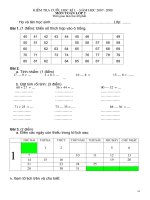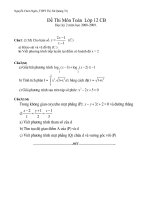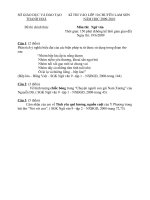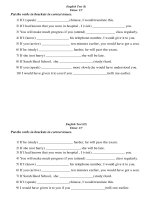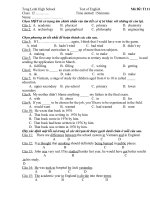- Trang chủ >>
- Đề thi >>
- Đề thi lớp 12
ĐỀ KSCL LẦN 2 LỚP 12 (CHUYÊN LAM SƠN)
Bạn đang xem bản rút gọn của tài liệu. Xem và tải ngay bản đầy đủ của tài liệu tại đây (147.57 KB, 7 trang )
TRƯỜNG THPT
CHUYÊN LAM SƠN
***
KỲ THI KIỂM TRA CHẤT LƯỢNG LỚP 12 (LẦN 2)
NĂM HỌC 2013 – 2014
Ngày thi: 26, 27/4/2014
Môn thi: TIẾNG ANH
Thời gian làm bài: 90 phút (không kể thời gian giao đề)
Đề thi gồm 7 trang, 80 câu.
Mã đề thi 275
Find the word with the stress pattern different from that of the other three words in each question.
Question 1: A. momentum B. monument C. momentary D. monetary
Question 2: A. absentee B. referee C. committee D. employee
Question 3: A. destitute B. nocturnal C. substantial D. phenomenon
Read the passage and the questions or unfinished sentences. Then choose the answer A, B, C, or D that you think
fits best.
WHY SO MANY CHILDREN?
The rapid population growth in less developed countries is a result of high birth rates. Women in these countries have
many children on average. Why do they have such large families, when feeding and caring for them can be a problem?
The answer may often be that they have no choice. Many factors make it difficult for women to limit the size of their
families.
Economics undoubtedly plays an important role. In poor countries, a large family is necessary for economic survival.
More children mean more hands for work. They also mean someone to take care of the parents in old age. In
industrialized countries, on the other hand, children do not increase family income. Instead, they are an expense.
Furthermore, people in these countries usually do not depend on their children in their old age.
However, economics cannot entirely explain birth rates. Saudi Arabia, for example, has one of the highest per-capita
incomes in the world, but it also has a very high birth rate (7.0). Mexico and Indonesia also do not follow the general
rule. Though they are poor countries, they have reduced their population growth by 53 percent and 25 percent in recent
years.
Clearly, other factors are involved. These factors may relate to the economic situation, but not necessarily. Population
experts now believe that the most important of these factors is the condition of women. A high birth rate almost always
goes together with lack of education and low status for women.
This would explain the high birth rate of Saudi Arabia. Traditional Arab culture gives women little education or
independence and few possibilities outside the home. It also explains the decline in birth rates in Mexico, Thailand, and
Indonesia. Their governments took measures to improve education for women and opportunities for them outside the
home. Another key factor in the birth rate is the availability of birth control. Women may want to limit their families,
but have no way to do so. In Ireland, for example, birth control is illegal. Not surprisingly, Ireland has the highest birth
rate in Europe. Where governments have made birth control easily available, on the other hand, birth rates have gone
down. This is the case in Singapore, Sri Lanka, and India, as well as in Indonesia, Thailand, and Mexico. In these
countries women have also been provided with health care and help in planning their families.
Yet another factor to influence birth rate is infant mortality. (Infant mortality is the percentage of babies who die in
their first year.) In industrialized countries infant mortality is around 1.5 percent. In less developed countries, however,
it can be 20 percent or more. Fearing the loss of some children, women are encouraged to have more.
Thus, an effective program to reduce population growth must work in many areas. But above all it must be aimed at
women and their needs. Only then does it have any chance of success.
Question 4: This passage is about ___.
A. women in less developed countries B. how economics can influence the birth rate
Page 1 of 6- Mã đề thi 275
C. population growth D. the main factors that influence the birth rate
Question 5: In poor countries, ___.
A. the birth rate is usually low B. the birth rate is usually high
C. the per-capita income is usually high D. children are an expense for the family
Question 6: In industrialized countries, children ___.
A. are an expense for the family B. help to care for their parents in old age
C. do not usually depend on their parents D. are necessary for economic survival
Question 7: According to the passage, Saudi Arabia is a ___.
A. rich country with a low birth rate B. poor country with a high birth rate
C. poor country with a low birth rate D. rich country with a high birth rate
Question 8: We can infer from this passage that women generally prefer to ___.
A. work at home B. have no children C. have smaller families D. have large families
Question 9: One reason for the high birth rate in Ireland is that ___.
A. birth control is not easily available B. birth control is easily available
C. many women work outside the home D. infant mortality is high
Question 10: A high infant mortality usually goes together with ___.
A. easily available birth control B. traditional cultures
C. education for women D. a high birth rate
Question 11: Governments are successful in slowing down population growth when ___.
A. infant mortality is eliminated B. they focus on the needs of women
C. parents are provided with old age pensions D. they help women to take care of their families
Question 12: Which is not a factor that influences the birth rate?
A. Economics B. Culture C. Infant mortality D. Children’s role
Question 13: According to the passage, what do Mexico, Thailand, and Indonesia have in common?
A. They have high per-capita incomes and high birth
rates.
B. Birth control is illegal.
C. Their governments give more advantages to women. D. They do not fear the loss of children.
From the four phrases A, B, C, and D, choose the one that best completes each of the following sentences.
Question 14: Declared an endangered species in the United States, ___.
A. people have gathered the ginseng root almost to the point of extinction
B. the near extinction of the ginseng root is due to excessive gathering
C. the ginseng root has been gathered almost to the point of extinction
D. gathering the ginseng root almost to the point of extinction
Question 15: ___ is that a chicken stands up to lay its eggs.
A. Many people don't realize B. What many people don't realize
C. It is that many people don't realize D. Because many people don't realize
Question 16: ___, Jesse Owens won four gold medals at the 1936 Olympics in Berlin.
A. Excellent speed and running ability B. The outstanding track athlete runs
C. An outstanding track athlete D. He had excellent speed and running ability
Question 17: In recent years, automobile emissions have disfigured stone carvings, corroded bronze monuments, and
___.
A. the soiling of ancient buildings B. soiled ancient buildings
C. ancient buildings D. ancient buildings being soiled
Question 18: ___ carry around calculating power which would have filled a large room forty years ago.
A. The present’s schoolchildren B. Present schoolchildren
C. Today schoolchildren D. The present time schoolchildren
From the four words A, B, C, and D, find the antonym of the underlined word in each of the following sentences.
Question 19: I'll have to whisper to you, otherwise he will hear.
A. say B. whistle C. shout D. talk
Question 20: Only the interior of the building is going to be remodeled.
A. exterior B. outward C. external D. coastal
Read the text below and decide which answer - A, B, C, or D - best fits each space.
SPRING FESTIVALS
Page 2 of 6- Mã đề thi 275
From (21)___ times people have celebrated the end of winter and the new life that spring brings. One of the most
important Christian festivals is Easter, (22)___ Christians remember the death and resurrection of Jesus Christ.
Easter, however, is not the (23)___ spring festival. In Sweden, people celebrate the end of winter by making
(24)___bonfires. Fire also plays an important part in the Hindu festival of Holi. In some villages children are carried
round bonfires by their mothers to protect them (25)___ danger in the coming year. Buddhists in Thailand soak (26)___
in water when celebrating their New Year, which (27)___ in the middle of April. In Antigua in Guatemala they carpet
the streets (28)___. Chinese spring parades are (29)___ colorful, but (30)___ flowers they have large dragon puppets
which dance in the streets.
Question 21: A. earliest B. latest C. previous D. old
Question 22: A. which B. when C. because D. by then
Question 23: A. only B. lone C. single D. solitary
Question 24: A. tremendous B. huge C. giant D. extreme
Question 25: A. in B. out of C. against D. from
Question 26: A. one other B. through C. each other D. mutually
Question 27: A. appears B. falls C. happens D. occurs
Question 28: A. in B. by C. with D. from
Question 29: A. the same B. as C. not less D. equally
Question 30: A. instead of B. on behalf of C. in spite of D. despite
From the four underlined words or phrases A, B, C, and D, identify the one that is not correct.
Question 31: Many (A) animal species are (B) totally colors blind but (C) the condition is very rare (D) in humans.
Question 32: Our nervous system has over ten (A) billions (B) nerve cells in a network covering (C) every inch of our
skin and (D) organs.
Question 33: A square is (A) a (B) geometric shape which is as long as (C) is tall and which (D) has four right angles.
Question 34: It is estimated that (A) at least a (B) million meteors have hit the Earth’s land surface, (C) which is only
25 (D)percentage of the planet.
Question 35: The US mint (A) makes frequently coins from (B) cheap alloys that are worth (C) far (D) less than the
value stamped on them.
Choose the sentence A, B, C, or D which is closest in meaning to the one given.
Question 36: She would not apologize even though she was sorry.
A. She was sorry, but she would not apologize. B. She was not sorry, but she apologized.
C. She was sorry that she did not apologize. D. She was sorry that she had apologized.
Question 37: William decided that an actor's life is not for him.
A. William didn't like to be an actor.
B. William said that an actor's life was boring.
C. William decided that he wasn't cut out for being an actor.
D. According to William, he was born to be an actor.
Question 38: I wasn't a bit surprised to hear that Karen had changed her job.
A. That Karen had changed her job surprised me a bit.
B. I was surprised that Karen hadn't changed her job.
C. Surprisingly, Karen had changed her job.
D. It came as no surprise to me to hear that Karen had changed her job.
Question 39: The children made every effort to please their father.
A. The children made little effort to please their father.
B. The children tried their best to please their father.
C. Please make every effort to please the children.
D. The children made few efforts to please their father.
Question 40: Despite his inexperience in the field, John applied for the job.
A. John applied for the job because he has experience in the field.
B. John did not apply for the job because of his inexperience in the field.
C. John applied for the job even though he had no experience in the field.
D. John was unable to do the job because he was inexperienced.
Page 3 of 6- Mã đề thi 275
From the four words A, B, C, and D, find the synonym of the underlined word in each of the following sentences.
Question 41: Because of cutbacks in council spending, plans for the new swimming pool had to be shelved.
A. stopped B. canceled C. disapproved D. delayed
Question 42: Peter is very thankful for all the help you have given him.
A. generous B. pleasant C. acceptable D. grateful
Question 43: She is eighteen, so by law her father cannot prevent her marriage.
A. avoid B. forestall C. defeat D. fail
Choose the correct word or phrase to complete each sentence.
Question 44: If you run ___ Steve, give him my best wishes.
A. over B. up C. into D. to
Question 45: It’s a pity we didn’t visit Tom when we had the chance. I ___ him before he left the country.
A. would like to see B. should like to see C. would like having seen D. would like to have seen
Question 46: If we want to ___ up with them we’d better hurry.
A. come B. catch C. approach D. arrive
Question 47: They are leaving the district, so they have put their house up for ___.
A. purchase B. sale C. offer D. trade
Question 48: The life of a spy is ___ with danger.
A. fraught B. intense C. stressful D. heavy
Question 49: She remembered the correct address only ___ she had posted the letter.
A. since B. after C. following D. afterwards
Question 50: The roof was damaged, and water ___ from the ceilings in wet weather.
A. drained B. dripped C. spilled D. dropped
Question 51: The politician tried to arouse the crowd, but most of them were ___ to his arguments.
A. closed B. indifferent C. careless D. dead
Question 52: I expected it will rain again when we're on holiday this year; but at least we are properly prepared ___ it
this time.
A. about B. at C. with D. for
Question 53: Many young people travel all over the world, and do all kinds of jobs before they ___.
A. settle down B. touch down C. lie down D. put down
Question 54: After his service to the country, he was ___ with a knighthood.
A. raised B. granted C. improved D. honored
Question 55: What's wrong with you today? Did you get out of bed on the wrong ___?
A. end B. side C. foot D. edge
Question 56: By the time they ___ at the concert, the tickets were sold out.
A. got through B. turned up C. filled in D. applied to
Question 57: I often wonder what people abroad make ___ Britain.
A. from B. of C. for D. by
Question 58: The fact of the ___ is we have a government that will do what it wants to do for the next two years.
A. matter B. problem C. point D. situation
Question 59: People who suffer from lung ___ should not smoke.
A. disease B. sickness C. illness D. ill health
Question 60: The racing driver climbed out of the wreckage completely ___.
A. unwounded B. intact C. unscathed D. well-preserved
Question 61: Your leg isn’t broken but it is badly ___.
A. fractured B. bandaged C. bruised D. bent
Question 62: When you fire, keep calm and just squeeze the ___ gently.
A. barrel B. trigger C. sight D. rifle
Question 63: He’s at a very ___ age and just tends to follow all the boys.
A. impressive B. impressionist C. impressing D. impressionable
Question 64: For someone who is in such a responsible position, he is surprisingly lacking in ___.
A. common sense B. sensibility C. sensation D. sentiment
Question 65: I'd rather you ___ smoke in here, if you dont mind.
A. didn't B. don't C. won't D. not
Question 66: He paid me some money in advance as a(n) ___ that he was honest.
A. proof B. indication C. test D. gesture
Page 4 of 6- Mã đề thi 275
Question 67: What do they mean by "COMING SOON" shown at the end of a film trailer?
A. It is a must-see film. B. It is a short film.
C. The première is near. D. The film has just come out.
Question 68: A: What is the phone number of Mr. President?
B: Search me!
In this situation, "Search me" means ___.
A. I will look up the phone directory. B. I don't know.
C. I shouldn't tell you. D. You should find it in my pocket.
Find the word that has its underlined part pronounced differently from the other three in each question.
Question 69: A. pale B. scalpel C. scale D. pail
Question 70: A. luxury B. exhaust C. exact D. anxiety
Read the passage and the questions or unfinished sentences. Then choose the answer A, B, C, or D that you think
fits best.
Whether you call it a "gap year", a "year out", or a "year off", the decision to delay going to university for a year after
leaving school is a difficult, but important, one.
Becky Roberts, now studying history at the University of Warwick, doesn't regret her decision to take a year off. "I'd
worked so hard for my A levels," she says. "I knew it would do me good to do something totally unrelated to studying
before embarking on a three-year degree course. My year off working for may dad's company wasn't a holiday by any
means but it was a break from the world of education, and that's just what I need."
Carl Sanchez agrees now halfway through a biology degree at Cardiff University. Carl spent much of his gap year
traveling. "I worked for about three months to save up enough money, then went to stay with some friends who live in
France. I ended up traveling round most of Europe, and even got over to Russia for a few weeks, which was fantastic."
Both Becky and Carl enjoyed their year off, but do they feel it's benefited them in terms of their university life now?
"Definitely," says Carl. "When I left school, I was a normal, fairly irresponsible eighteen year-old. I hadn't been
anywhere, I hadn't done anything. A year later, when I went to university, I felt much more like an adult than a child."
"I know a few people at Warwick who took a year off," says Becky. "Generally, we're more dedicated to our studies
than those students who came straight from school. We've got different priorities. We want to have fun, of course, but
we realize we're here to get our degrees, I don't think some of the others have quite realized why they're at university
yet."
There are drawbacks to taking a gap year, though. Penny Cartwright went straight from school to study medicine at
Imperial College, London. "I thought about taking a gap year but decided against it and don't regret the decision for a
minute. Becoming a doctor takes such a long time " I'll be about 26 years old before I can start earning any money "
that the sooner you start, the better, in my opinion. It might be fun, but it's really just a wasted year in terms of career
development."
There's also the financial consideration. If you do decide to take a year off, and you don't want to work the whole time
as Becky did, you have to be able to pay for it. Susan Jenkins, a Careers Officer, points out that parents are now less
likely to fund their child's year off. "Twenty years ago, it was fairly common for parents to say to their son or daughter,
"Here's two thousand pounds, go and have fund abroad for a few months." Nowadays, because parents have to pay so
much more for the child's education while they're at university, they just can't afford to pay for this extra year too."
One option, of course, is to do what Carl did: work for a few months in order to save up for a trip abroad. Another
option is to find casual work while traveling abroad. "There are now a lot of books and websites with loads of
information for people who want to do this," says Susan. "It's a great way to see the world, gain experience, and get
money for living expenses all at the same time. But don't expect to earn enough to save any money."
Page 5 of 6- Mã đề thi 275
So, should you take a gap year? The answer is: it depends. If you want a break from books and essays, then it's
probably a good idea - as long as you, or your parents, can afford it and as long as you're going to do something
worthwhile during your time off. Sitting at home watching TV doesn't count! If you want to get your degree and start
regular employment as quickly as possible, a gap year may not be so sensible.
Question 71: Becky took a year off because she ___.
A. needed to see what working for her father was like.
B. wanted to do something different for a while.
C. felt she needed a long holiday before university.
D. had done so well in her A level exams at school.
Question 72: Carl says that a year off helped him ___.
A. become more mature and experienced B. learn the importance of saving money
C. make friends in many different countries D. become more knowledgeable about geography
Question 73: According to Becky, students who didn't take a year off ___.
A. are less intelligent than those who did B. probably won't end up with a degree
C. don't want to have fun at university D. are less hard-working than those who did
Question 74: According to Penny, a year off ___.
A. should be taken when you're about 26 years old B. is better once you've actually started your course
C. merely delays the time when you can get a job D. can be enjoyable and useful for your future work
Question 75: In the past, parents were more likely to ___.
A. pay for their child's education at university B. give their child money to help with their year off
C. encourage their child to go straight to university D. force their child to take a year off before university
Question 76: Susan issues a warning about ___.
A. low wages for casual work abroad B. information from books and websites
C. paying for everyday expenses abroad D. the difficulty of finding casual work
Question 77: This article would probably not appear in ___.
A. the education section of a newspaper B. a handbook for school-leavers
C. a magazine for young people D. a textbook for university students
Question 78: What is the attitude of the author towards a gap year?
A. positive B. negative C. skeptical D. Neutral
Question 79: What is the most suitable title for the passage?
A. Advantages of a gap year B. A gap year: Should or shouldn't?
C. Disadvantages of a gap year D. A gap year: Chance or challenge?
Question 80: To whom is the article most likely to be recommended?
A. toddler B. those in their early teens C. those in their late teens D. pensioner
THE END
Page 6 of 6- Mã đề thi 275
